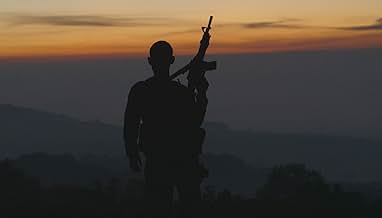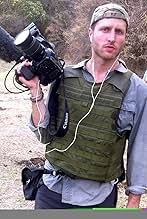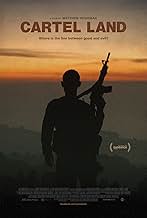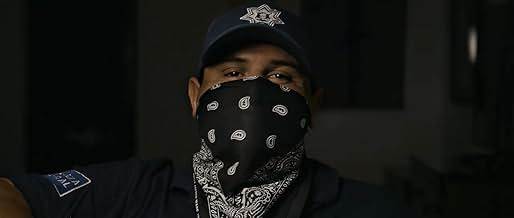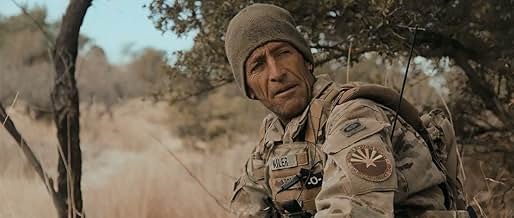Filmmaker Matthew Heineman examines the state of the ongoing drug problem along the U.S.-Mexican border.Filmmaker Matthew Heineman examines the state of the ongoing drug problem along the U.S.-Mexican border.Filmmaker Matthew Heineman examines the state of the ongoing drug problem along the U.S.-Mexican border.
- Nominated for 1 Oscar
- 19 wins & 38 nominations total
Nicolás Sierra
- Self
- (as as Nicolás Sierra 'El Gordo')
Alfredo Castillo Cervantes
- Self - Mexican political
- (as Alfredo Castillo)
María Imilse Arrué
- Self
- (as María Imilse)
Storyline
Did you know
- TriviaThe Autodefensas group shown in the film was created by civilians to stand up against the cartels because the government is overrun with corruption. Individuals speak about how little the Mexican president (Enrique Peña Nieto) is doing. In the film, the Autodefensas is shown celebrating its one year anniversary on February 24, 2014. On that exact same day, TIME Magazine ran an issue with the Mexican President Enrique Peña Nieto with the headline "Saving Mexico." Nieto reportedly paid TIME $44,000 for this cover article coincidentally released on the same day as the Autodefensas anniversary.
- Quotes
José Manuel 'El Doctor' Mireles: Get everything you can out of him, and then put him in the ground.
- SoundtracksEn Las Calles
Written by H. Scott Salinas and Jose Cancela
Featured review
Review: What a brilliant documentary! It really did seem like it was a feature film because it's full of action and intense drama. The director, Matthew Heineman, was lucky to gain the trust of Dr. José Mireles and Tim "Nailer" Foley, to go behind the scenes and film the gruesome problems in the Mexican state of Michoacan and the Arizona border, which is used by the drug cartels to bring drugs into America. Both stories involve heavy corruption, kidnap, horrifying murder, rape and black mail. Matthew put together enough material to tell the terrifying story about the drug cartels who will kill anybody who step in there way. Tim is an ex veteran who suffered abuse from his father and left home at the early age of 15. After working in various jobs and losing his house due to the credit crunch, he started to work alongside immigrants, who worked illegally and didn't pay any taxes. He then decided to use his savings to put together an elite force called the Arizona Border Recon in Arizona's Altar Valley, to stop the drug cartels from bringing there drugs into America and to stop the war causing any problems across the border. His small force use heavy artillery and patrol during day and night to protect his home and infiltrate the cartels various methods of trafficking drugs. As there isn't any laws to protect them, they basically take matters into there own hands and risk there life's for there country and to make sure that things don't get out of hand. While Tim is battling against the cartels, who are using the newest technology to communicate, Dr. José Mireles is also battling against the cartels but his war is to protect Michoacan and to gain control of the various towns which have many violent gang members, called the Knight Templars, who are causing havoc in there communities. After giving speeches in the various towns, he manages to put together a force called the Autodefensas, who use heavy artillery and group together in numbers to get the perpetrators out of the many villages. He successfully cleans up many of the small towns and he becomes highly respected around Michoacan. He then ends up in a plane crash, which paralysed a side of his face and seriously damages his back, so he takes time out from the Autodefensas and goes into hiding because he doesn't know if the crash was a hit from the cartels. On the anniversary of the Autodefensas, José comes out of hiding and takes back control of his elite force but everything has got out of control and a lot of the Autodefensas are using there powers to do bad things. As they haven't got the right to have guns and apply force around Michoacan, the government step in and build there own force, which pushes José out of control. All of his fellow workers join the government force because they are allowed to use guns by law and Jose's life becomes in danger because he has broken so many laws when he was in control. When they eventually catch up with José, they put him in a Federal Centre for Social Re-adaptation in Hermosillo, Sonora. Although he still gains support from the villagers, he has basically become a political prisoner who is kept behind bars to silence him and take full control of his elite force. It has all the makings for a brilliant film but as this is a documentary about true events, I found it thrilling and quite emotional, especially when you hear what some of the community went through. The story that was told by the lady who watched her husband being burnt to death, was awful and it really shows how far these cartels are willing to go, to bring fear into people's life's. There also are some intense shoot-outs which must have been extremely scary for the director, who was in the heart of the action. Anyway, this movie definitely gave a graphic insight into a world which I totally didn't know existed and right from the beginning, when the members of the cartels are cooking the "Meth", I was glued to the TV until the end. Great!
Round-Up: This brilliant documentary was put together by Matthew Heineman who brought you Overcoming The Storm, which is about several residents returning to there homes in New Orleans after hurricane Katrina, Our Time, which is about 4 youths who travel across America to ask there peers serious questions about life in America today and Escape Fire: The Fight Of Rescue American Healthcare, which uncovers the U.S. Healthcare systems true design. I personally would watch Matthew's other documentaries because he really did get to the heart of the problem with this movie and put his life on the line, to the point were he didn't put on his bullet proof vest during one of the shoot-outs because he wanted to catch all of the action on camera. The movie did make me investigate what really did happen to José, who is still in prison but I did find it a bit weird that no one looked into the camera during the scenes in the various villages and the shoot-outs. That did make me question if the documentary was real but when I watched the bonus material on the DVD, I realised that these events really did happen. The cartels value for life did shock me and I can't imagine how it must be to live your life in fear, 24 hours a day. I think you can tell that I really enjoyed this film and I hope that it gets the recognition that it deserves.
Budget: N/A Worldwide Gross: $1.1million
I recommend this movie to people who are into their documentary/action/drama movies about a physician in Michoacan, Mexico, who leads a citizen uprising against the drug cartel that has wreaked havoc on the region for years. 8/10
Round-Up: This brilliant documentary was put together by Matthew Heineman who brought you Overcoming The Storm, which is about several residents returning to there homes in New Orleans after hurricane Katrina, Our Time, which is about 4 youths who travel across America to ask there peers serious questions about life in America today and Escape Fire: The Fight Of Rescue American Healthcare, which uncovers the U.S. Healthcare systems true design. I personally would watch Matthew's other documentaries because he really did get to the heart of the problem with this movie and put his life on the line, to the point were he didn't put on his bullet proof vest during one of the shoot-outs because he wanted to catch all of the action on camera. The movie did make me investigate what really did happen to José, who is still in prison but I did find it a bit weird that no one looked into the camera during the scenes in the various villages and the shoot-outs. That did make me question if the documentary was real but when I watched the bonus material on the DVD, I realised that these events really did happen. The cartels value for life did shock me and I can't imagine how it must be to live your life in fear, 24 hours a day. I think you can tell that I really enjoyed this film and I hope that it gets the recognition that it deserves.
Budget: N/A Worldwide Gross: $1.1million
I recommend this movie to people who are into their documentary/action/drama movies about a physician in Michoacan, Mexico, who leads a citizen uprising against the drug cartel that has wreaked havoc on the region for years. 8/10
- leonblackwood
- Dec 19, 2015
- Permalink
- How long is Cartel Land?Powered by Alexa
Details
Box office
- Gross US & Canada
- $704,352
- Opening weekend US & Canada
- $15,581
- Jul 5, 2015
- Gross worldwide
- $1,145,923
- Runtime1 hour 40 minutes
- Color
- Aspect ratio
- 2.35 : 1
Contribute to this page
Suggest an edit or add missing content








